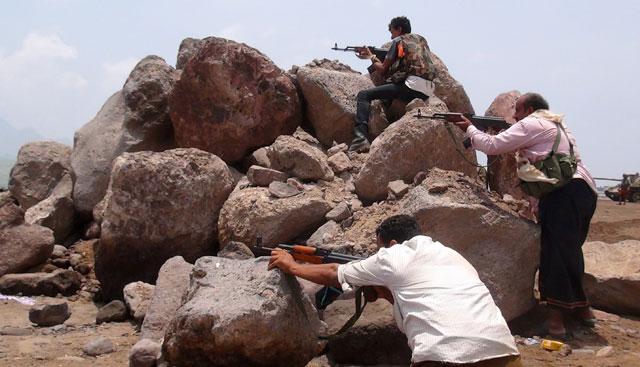You are here
Yemen’s newly returned leader works to stamp authority
By AFP - Sep 23,2015 - Last updated at Sep 23,2015
ADEN — Yemen's President Abed Rabbo Mansour Hadi worked Wednesday to restore his authority after returning from six months of exile with a vow to liberate the country from Shiite Houthi rebels.
Hadi's first act was to chair a meeting of Cabinet members already back in the southern port city of Aden, which had been the embattled leader's last refuge before he fled to Saudi Arabia in March.
He instructed the ministers to focus on basic services such as water, electricity, housing, healthcare and security for ordinary Yemenis in the impoverished and war-battered country.
On the security front, the 70-year-old president stressed the need to integrate members of the Popular Resistance pro-government militia into the regular army, the government-run Saba news agency reported.
Under the cover of Saudi-led coalition air strikes, loyalists have battled the Houthis alongside the Popular Resistance volunteer force, southern separatists, Islamist militants and Sunni tribes, in a makeshift alliance.
Hadi, who is recognised by the international community, flew in late Tuesday aboard a Saudi military aircraft that landed at an air base adjoining the civilian airport in Aden.
The president promised the Yemeni people that the Houthis, who hailed from the mountainous north, would be driven from the capital Sanaa.
“The return to the capital Sanaa will come soon after the liberation of all cities and provinces,” from the hands of militias, he said in a statement.
The presidency said Hadi would remain in Aden for a few days before heading to New York to attend the UN General Assembly which runs until October 6.
Opens road to Sanaa
Analysts view the return of Hadi as mostly symbolic in the short term.
“It’s a signal to all the actors, in the Houthi-camp or anti-Houthi, that the legitimate government is back,” said Mathieu Guidere, a professor and Middle East specialist at the University of Toulouse in France.
“This will not in itself change much on the ground but it will open up the road to Sanaa for the coalition, at the official invitation of the sitting government,” he said.
Hadi, a southerner, fled the rebel-controlled capital in February after escaping house arrest under the Houthis, and took shelter in Aden.
But the following month he was forced to abandon the southern city and go into exile in Riyadh as the Houthis advanced, and soon afterwards the Saudi-led coalition launched an air war against the rebels.
Much of Aden has been reduced to rubble by ferocious fighting between government forces supported by coalition air strikes and Houthis backed by renegade soldiers loyal to ousted president Ali Abdullah Saleh.
In July, bolstered by training and equipment provided by the coalition, the loyalists retook Aden, enabling Prime Minister Khaled Bahah and several ministers to return last week.
The Houthis have since lost five southern provinces to pro-government forces, who on September 13 launched a major offensive in oil-rich Marib province east of the capital, with thousands of Saudi and Emirati soldiers deployed on the ground.
But the Iranian-backed rebels, who still control much of northern and central Yemen, appear to have slowed the loyalist advance.
Pro-Hadi forces have also been locked in fierce fighting to retake Yemen’s third city Taez, which is seen as a crucial gateway to Sanaa.
The United Nations says around 5,000 people have been killed and 25,000 wounded, many of them civilians, since late March in Yemen.
The UN aid chief has called the scale of human suffering in Yemen “almost incomprehensible”.
Related Articles
Shiite rebels freed more than 300 prisoners in the southern city of Dhale, Yemeni security officials said, as the rebels fought pitched battles with supporters of the country's beleaguered President Abed Rabbo Mansour Hadi in the southern port city of Aden.
ADEN — Yemen’s government accused southern separatists of an attempted coup on Sunday after they took over its headquarters amid fierce clas
ADEN — Warplanes from the Saudi-led coalition hit Yemen rebel positions Saturday as reinforcements reached pro-government forces preparing f

















